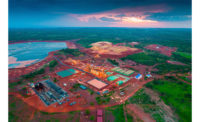Earlier this month at the International Federation of Consulting Engineers' annual conference in Davos, Switzerland, Africa was recognized as a major market for infrastructure, with political upheavals in the Arab north creating new opportunities, according to regional speakers. Further, major investments are needed in sub-Saharan nations to sustain economic growth rates that now outstrip those of industrialized nations.
Originally set to take place in Tunisia, the Oct. 2-5 conference was switched last spring by the organization, known as FIDIC, amid rising tensions in North Africa, said outgoing President Greg Thomopulos, chairman and
 |
| THOMOPULOS |
North African infrastructure prospects will emerge from political changes, and the outlook for construction is “positive,” even in countries “where there have been no revolutions,” said Alain Bentéjac, CEO of COTEBA S.A., Paris. “Large countries in North Africa are growing very fast, and there are huge needs,” he said. “The transition period could be difficult.”
In Morocco, public spending priorities have shifted from infrastructure to social investments, said Moncef Ziana, CEO of C.I.D., S.A, one of the country's largest design firms, with some 400 staff. Yet international design firms with weakened home markets are bidding tightly, undercutting locals at times, he added. Most North African countries are self-sufficient in construction engineering, but “they often request [foreign] assistance when it comes to complex projects,” said Karim Hidar, an associate with Groupe Accelea, Tunis, Tunisia. “The size and structure of most [regional] consulting firms … prevent them from fully taking advantage of the potential engineering industry.”
Sub-Saharan Africa's business opportunities “are potentially very large,” particularly for infrastructure across the region's agriculture sector and in industries related to natural resources, said Trevor Manuel, South Africa's planning minister. Improving African living standards is “inextricably intertwined” with engineering, but poor infrastructure remains the “biggest impediment“ to new investment.
 |
| PEDERSEN |
By embracing the UN's Global Compact in 2007, “we are obligated to respond to actions of collaborators to whom we are not connected contractually. That was a surprise for me,” said Pedersen. Rambøll's integrity policy focused on corruption, but “human and labor rights were not in our minds as clearly.”
Rambøll has since imposed a duty on employees to report labor and human-rights breaches of collaborating companies and agencies, even when the design firm has no contractual responsibility for working conditions, said Pedersen. “It's with some hesitation that I now consider myself as a kind of policeman.” Thomopulos said FIDIC was revamping its “integrity management system” to be easier for small firms and practitioners to use. He said the previous version “was too complex and had no credibility with the banks.”











Post a comment to this article
Report Abusive Comment